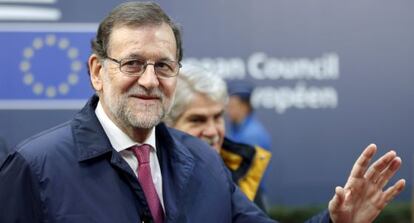PM rejects notion of “great coalition” with Socialists
On the last day of campaign, Rajoy seeks to portray himself as winner of Sunday’s polls

Spanish Prime Minister Mariano Rajoy on Friday rejected the notion that his ruling Popular Party (PP) would try to form a grand coalition with the main opposition Socialist Party (PSOE) after Sunday’s general election, in a bid to stop emerging political forces Podemos and Ciudadanos from entering government.
“I don’t know who proposed that; I certainly didn’t,” Rajoy told state radio station RNE on the last day of the campaign. “No one in the PP has made a proposal for such a coalition.”
No one in the PP has made a proposal for such a coalition” Prime Minister Rajoy
The prime minister, whose party stands to win the elections but may not have enough for a majority in parliament, has refused to discuss any possible pacts that the PP may be forced to hammer out with other parties until after the race concludes.
At the same time he was keen to avoid starting Saturday’s so-called voter reflection day by delivering a message that he is aware that the PP will come up short in Congress. Instead he focused on his prediction that he will be the winner on Sunday, and as such guaranteed a “stable government.”
But to guarantee the stability needed to fix the Spanish economy and win international credibility the PP will have to seek out political partnerships – an issue on everyone’s minds, and one that Rajoy had refused to discuss publicly at this point.
He also denied a report that the PP was willing to negotiate with the Socialists only if its leader Pedro Sánchez is removed as secretary general. “That is not on the table,” Rajoy said.
The relationship between the two politicians soured following Monday night’s debate when Sánchez aggressively attacked the prime minister for corruption and accused him of “not being honest.” The PP camp complained that Sánchez was being disrespectful to Rajoy.
Spaniards go to the polls on Sunday in a historic race that, for the first time, has seen the rise of two emerging parties (Podemos and Ciudadanos), something that could change the political landscape of Spain dramatically.
Because of the tight race, party leaders have stepped up their attacks against one another.
Results from the last EL PAÍS poll taken before the official cutoff date for such surveys showed that the PP would win with 25.3% of the vote, while the Socialists are in a deadlocked race for second place with Podemos.
The voter-intention survey conducted by the polling firm Metroscopia between December 7 and 10 showed that Sánchez and his Socialists would garner 21% while Pablo Iglesias’ Podemos grouping would obtain 19.1%. Cuidadanos, which is led by Albert Rivera, has fallen back to 18.2%, according to the poll.
As long as the PP has more support we can stop a government made up by seven political forces”
The prime minister suggested that the opposition has been holding serious discussions about forming partnerships, and said that he had “solid information,” which he did not reveal, that the Socialists and Podemos are looking to form their own coalition.
Rivera has said that his Ciudadanos party will abstain from voting for any new government but has not said if he would be willing to also join this partnership that is supposedly being discussed.
On Thursday during a meeting with business leaders in Barcelona, Rajoy said that the PP “has to win the elections” because it is the “only real alternative to that Socialist-Podemos coalition.”
This issue was again brought up on Friday by Rajoy in another interview with the COPE Catholic Church-funded radio network. He spoke about the possibilities of a coalition of “eight to nine parties,” in which he included the Socialists, Podemos, Basque Nationalists (PNV), pro-Basque independence Amaiur, and Convergencia of Catalonia.
“The worst thing that can happen to Spain is to have such a monumental coalition. As long as the PP has more support we will can stop a government being made up by seven political forces,” he said.
The prime minister did admit that he will have to seek support if he doesn’t win the majority of seats in the 350-member Congress and said he found it “inconceivable” that Ciudadanos wouldn’t vote for a new government.
English version by Martin Delfín.
Tu suscripción se está usando en otro dispositivo
¿Quieres añadir otro usuario a tu suscripción?
Si continúas leyendo en este dispositivo, no se podrá leer en el otro.
FlechaTu suscripción se está usando en otro dispositivo y solo puedes acceder a EL PAÍS desde un dispositivo a la vez.
Si quieres compartir tu cuenta, cambia tu suscripción a la modalidad Premium, así podrás añadir otro usuario. Cada uno accederá con su propia cuenta de email, lo que os permitirá personalizar vuestra experiencia en EL PAÍS.
En el caso de no saber quién está usando tu cuenta, te recomendamos cambiar tu contraseña aquí.
Si decides continuar compartiendo tu cuenta, este mensaje se mostrará en tu dispositivo y en el de la otra persona que está usando tu cuenta de forma indefinida, afectando a tu experiencia de lectura. Puedes consultar aquí los términos y condiciones de la suscripción digital.









































